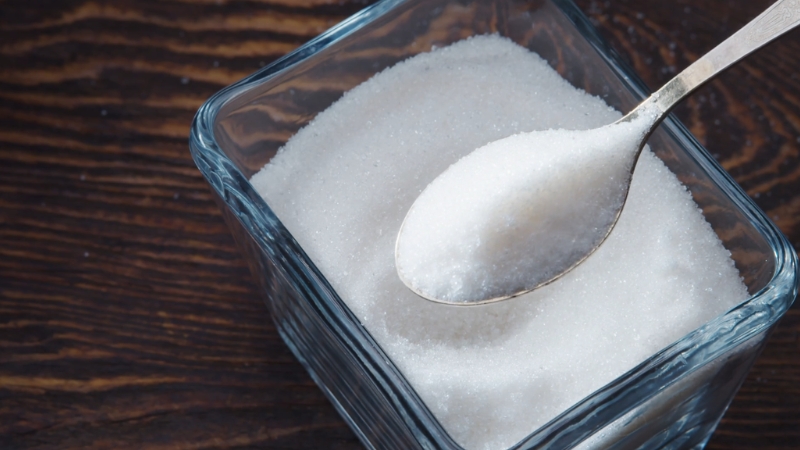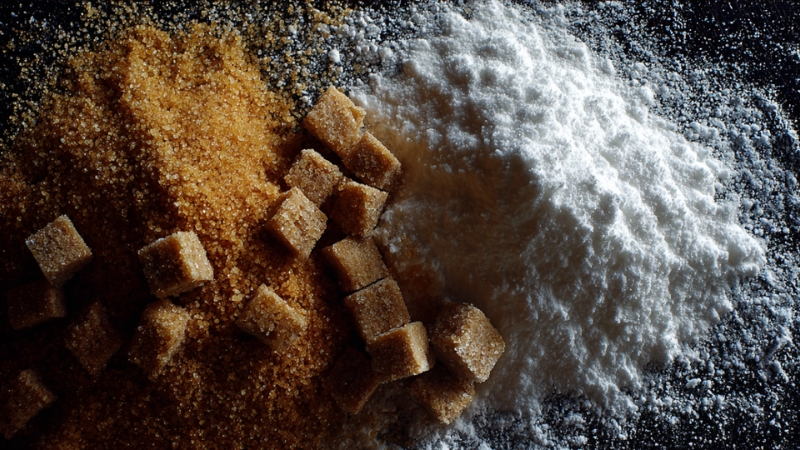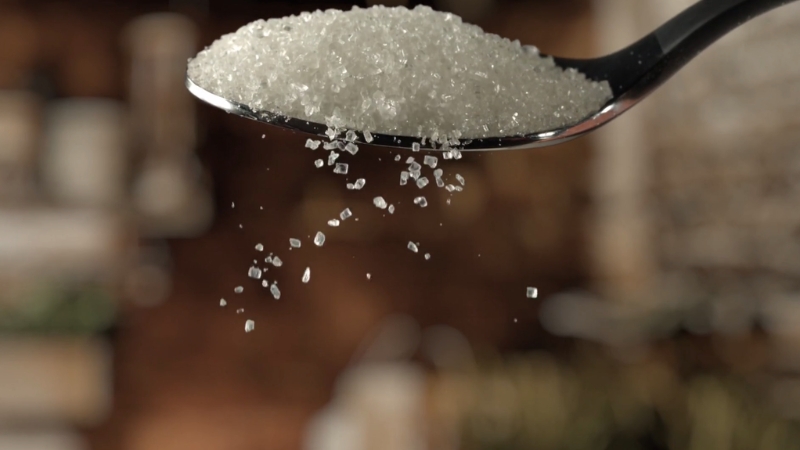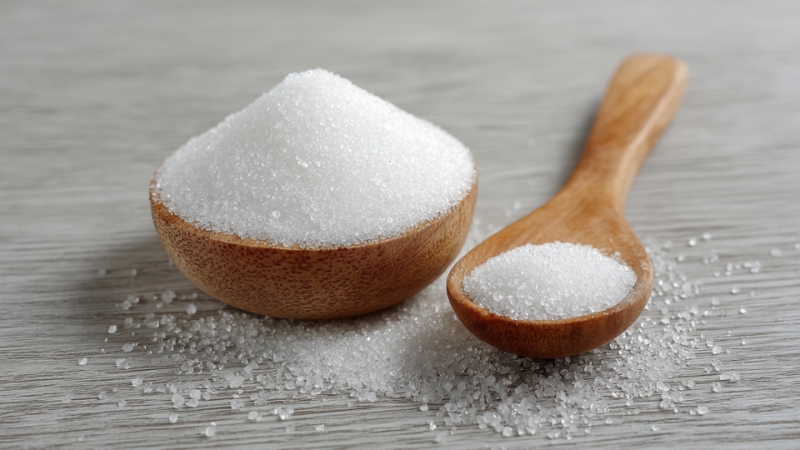Is White Sugar Vegan in the US? – Certifications and Rules
If you’re newly vegan or even just curious about what’s in your pantry, sugar can be a surprisingly tricky subject. You’d think it would be simple-sugar comes from plants, right?
But in the United States, whether a bag of white sugar is considered vegan depends not on the plant it grew from but on how it was refined.
Some sugars are completely animal-free; others are not. The catch lies in a material called bone char.
In this guide, I’ll walk you through how sugar is made in the US, where bone char comes into play, which brands you can trust, and what practical steps you can take to shop confidently.
By the end, you’ll have a clear picture of what’s vegan, what’s not, and how to avoid confusion without giving up your sweet tooth.
Key Points
- Beet sugar and all USDA Organic sugar are always vegan.
- Cane sugar may or may not be vegan depending on the refinery’s use of bone char.
- Florida Crystals, Pioneer (beet sugar), and organic-labeled brands are safe vegan options.
- Packaged foods labeled only as “sugar” don’t reveal the source, so certifications help.
The Bone Char Question
View this post on Instagram
The heart of the debate around white sugar in the US is bone char. Bone char is a granular carbon material created by heating cattle bones to very high temperatures until they turn into a porous filter.
For decades, some cane sugar refineries have used it to remove natural pigments from sugarcane juice and create the bright white crystals most of us recognize as table sugar.
From a chemical perspective, bone char doesn’t end up in the sugar you buy. It’s used as a filter, and the crystals are pure sucrose by the time they reach your kitchen.
That’s why kosher certification isn’t an issue, as kosher authorities classify bone-char-processed sugar as pareve (neither meat nor dairy). But vegan standards are different.
For many vegans, it’s not enough that the animal product isn’t in the final food. If it’s used at any stage of production, it’s a problem.
Cane vs. Beet: The Two Sources of Sugar in the US
According to the Federal Register, in the United States, most refined sugar comes from two crops: sugarcane and sugar beets.
Knowing which one your sugar came from is the first step to figuring out whether it could involve bone char.
Sugarcane
Roughly 40-45% of domestic sugar production comes from cane. Some cane sugar refineries use bone char; others don’t.
The variability is why cane sugar is the gray zone for vegans.
Sugar Beets
Beets supply a little more than half of the US sugar supply. Importantly, beet sugar is never processed with bone char.
Beet sugar factories rely on other types of filtration and decolorization. If you’re holding a bag of beet sugar, you can be confident it’s vegan.
Chemically, sucrose is sucrose. Whether it came from cane or beets, it’s the same molecule, and it behaves the same way in your coffee or your cookie dough. The difference lies entirely in the refining method.
What Major Producers Say

You don’t have to play guessing games. Several of the largest sugar producers in the US publish clear policies about bone char use.
Domino Sugar and C&H (ASR Group)
Domino’s statement explains that most of its refineries no longer use bone char, but there are two exceptions: Crockett, California and Arabi, Louisiana.
Bags produced at those plants are not vegan-friendly. Domino refineries in Baltimore, Yonkers, and South Bay, Florida are bone-char-free.
Florida Crystals
Florida Crystals states openly that its sugars are never touched by bone char or animal by-products.
They go a step further by carrying Certified Vegan labels from Vegan Action. If you want cane sugar that’s guaranteed vegan, Florida Crystals is a safe choice.
Michigan Sugar Company / Pioneer Sugar
Michigan Sugar produces beet sugar under the Pioneer brand. Their official policy confirms they don’t use bone char, and they even have a vegan statement on file. If you see Pioneer on the shelf, you can buy with confidence.
Together, these examples show why sweeping claims like “white sugar isn’t vegan” are outdated. It depends on where the sugar was processed and whether it’s cane or beet.
Organic Sugar Is a Safe Bet
If you’re overwhelmed by brand-by-brand research, there’s a simpler path: buy certified organic sugar. Under the USDA National Organic Program, processors can only use activated charcoal derived from plant material, not animal bones.
That means all certified organic sugar in the US is bone-char-free by rule. You don’t have to check refinery maps or track brand policies – if it says USDA Organic, you’re good.
Adding another layer, Vegan Action’s Certified Vegan label requires proof that no animal-derived materials were used at any point.
If you see this logo on sugar or a packaged food, the company has documented its supply chain accordingly.
Why Labels Don’t Always Help
Here’s where it gets tricky for packaged foods: ingredient labels almost always just say “sugar.” They don’t tell you whether it came from cane or beets, let alone how it was filtered.
Sometimes a label will specify “cane sugar,” which rules out beet, but it still doesn’t tell you if bone char was used. And if it just says “sugar,” it could be either.
That lack of transparency is baked into FDA rules. For example, when companies used the term “evaporated cane juice,” the FDA stepped in and required them to just call it “sugar.”
From a consumer standpoint, that means less detail, not more. So if you’re trying to avoid bone char entirely, you can’t rely on ingredient lists alone.
You either need to stick to certified organic or vegan-labeled products or reach out to companies for clarification.
Common Sugar Types and Their Vegan Status
Here’s a quick breakdown of what you’ll see in stores:
| Sugar type | Typical source | Bone char used? | Vegan friendly? | Notes |
| White granulated beet sugar | Beet | No | Yes | Beet sugar is never bone-char processed. |
| White granulated cane sugar | Cane | Sometimes | Mixed | Depends on refinery; some use bone char, others don’t. |
| Organic cane sugar | Cane | No | Yes | USDA organic prohibits bone char. |
| Brown sugar | Cane or beet | Sometimes | Mixed | Usually white sugar with molasses; vegan status depends on the base sugar. |
| Powdered (confectioners’) sugar | Cane or beet | Sometimes | Mixed | Base sugar decides; starch added is usually vegan. |
| Turbinado, demerara, raw sugars | Cane | Rarely | Often | Less refined, usually not filtered with bone char. |
| Coconut, maple, date, etc. | Various plants | No | Yes | Bone char not used for these alternative sweeteners. |
Brown Sugar and Powdered Sugar Explained

Two everyday products deserve special mention:
Brown Sugar
In most cases, brown sugar isn’t “raw” or “less refined.” It’s just white sugar with molasses added back.
If the base white sugar was filtered with bone char, then the brown sugar inherits that history. If the base is organic or beet sugar, it’s fine.
Powdered (Confectioners’) Sugar
Powdered sugar is simply white sugar ground to a fine texture with a small amount of starch to prevent clumping. The starch is usually cornstarch, which is vegan.
Again, the question is whether the base white sugar came from a bone-char refinery.
Kosher vs. Vegan Standards
It’s worth noting that kosher certifications and vegan certifications aren’t interchangeable. Bone char doesn’t present a kosher problem because it isn’t an ingredient; it’s filtered out.
That’s why conventionally refined cane sugar can still carry kosher pareve labels. Vegan standards are stricter.
From a vegan perspective, the use of animal-derived materials anywhere in the process is a dealbreaker. That’s why organic and vegan certifications are such useful shortcuts.
Practical Shopping Tips

If You’re Buying Straight Sugar
- Pick USDA Organic sugar. Guaranteed bone-char-free.
- Choose beet sugar brands like Pioneer Sugar.
- Go with cane sugar brands that state no bone char, like Florida Crystals.
- For Domino or C&H, check if the bag lists a refinery location, or buy their organic line.
If You’re Buying Packaged Foods
- Look for Certified Vegan or USDA Organic labels.
- If you can’t find those, reach out to the company if it matters to you.
- Know that if a label just says “sugar,” you won’t be able to tell the source.
FAQs
10-Second Decision Tree
If you only remember one thing, make it this:
- Buy USDA Organic. Always vegan.
- Or buy beet sugar. Always vegan.
- Or buy from brands that publicly say no bone char, like Florida Crystals. ✔ Verified by the company.
Bottom Line
@thebakingnirvana Did you know that traditionally, granulated/white sugar was refined using natural charcoal (in the video I said carbon in error), also known as bone char? Bone char is made from animal bones, usually from cows. Therefore, sugar refined in this manner is not recommended for vegan or vegetarian consumption. In Canada, Redpath Sugar does not use this method of refining. Hope this helps you on your vegan/vegetarian food consumption and baking journey 💜 #vegan #vegetarian #animalbyproducts #crueltyfree #refinedsugarfree #sugar #veganfood #veganfoodfacts #foodfacts #vegetarianfood #vegansofig #veganlife #veganism #veganlifestyle #veganbaking #foodhistory #factoftheday #bramptoncakes #bramptonbakery #myredpathrecipe #redpathsugar #brownsugar #whitesugar #sugarproduction ♬ original sound – nirvana | thebakingnirvana
Sugar is one of those ingredients where the production story matters more than the science. The molecule itself, sucrose, is the same no matter where it comes from.
But the way cane sugar is refined in parts of the US can involve bone char, which takes it out of the vegan category. The good news is you don’t have to give up sweets to stay consistent with vegan values.
It is similar to questions people often ask about condiments, like whether soy sauce is really vegan, where the answer depends on the specific production process.
Organic sugar, beet sugar, and several cane brands are all reliable, transparent, and animal-free. Once you know the options, shopping becomes second nature.
So next time you’re in the baking aisle, don’t stress. Just reach for organic, beet, or certified vegan sugar and enjoy your cookies without hesitation.
Hello, my name is Marina Vlasov. Im currently trying to change my career from my current job to becoming a chef. It is a hard road, but I feel like im coming there soon. While I enjoy preparing practically all food, from various cuisines from all over the globe, I must say that I mostly enjoy preparing vegan food. That is my strongest side. That is why I want to provide you with the best vegan food recipes on this blog of mine.

